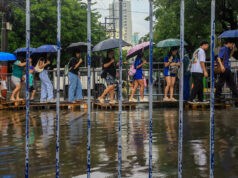Manila told to boost defense to preserve maritime biodiversity

A SECURITY think tank on Monday called for a stronger maritime defense system to protect the biodiversity in areas claimed by the Philippines in the South China Sea.
“Various security issues on the West Philippine Sea are affecting its biodiversity and marine resources, and have limited tourism opportunities in the area,” Victor Andres C. Manhit, president of Stratbase ADR, said in a statement, referring to areas of the sea within the country’s exclusive economic zone.
The government, in cooperation with scientists and environmentalists, should craft strategies that will “sustain biodiversity and develop Philippine marine resources,” he said.
Mr. Manhit said unlawful land reclamation activities, construction of artificial islands and other intrusions within the Philippines’ exclusive economic zone “cannot continue.”
“We believe that the security in the West Philippine Sea in the traditional, nontraditional and emerging domains must be acted upon through a strategic and responsive inter-agency approach.”
Mr. Manhit cited a 2016 arbitral ruling that voided China’s sweeping claims over the South China Sea. The United Nations-backed court found that land reclamation and construction of artificial islands had caused “irreparable harm to the coral reef ecosystem.”
Despite the ruling, such unlawful practices are still being carried out, causing “severe damage to marine life and ecosystems” of the West Philippine Sea, he said.
He said tourism initiatives would make the area more accessible to Filipinos. “In all these endeavors, the efforts of the national and international community to secure biodiversity and promote tourism must complement and respect the Philippines’ 2016 arbitral victory,” he said.
The Philippines will benefit from Australia’s P3.6-billion investment in maritime and environmental protection, Stratbase said in the statement.
“The marine environment is under threat from pollution, climate change and over-exploitation. And it is more important than ever that we work together to protect it,” Australian Embassy Deputy Head of Mission Moya Collett said in the statement.
“We are proud to support the Philippines in its efforts to preserve the marine environment and become more climate change- and disaster-resilient,” she added.
The Australian government has funded a number of coral restoration projects throughout the Philippines including in Pangasinan, Verde Island Group, Palawan and Zambales.
“Australia highly values its maritime partnership with the Philippines, and we will continue to work together to protect maritime biodiversity, which is so important to the health and prosperity of our two nations,” Ms. Collett said.
Tensions between the Philippines and China have risen in the past months, with the Philippine Coast Guard boosting efforts to expose its neighbor’s expansive activities.
President Ferdinand R. Marcos, Jr.’s decision to widen US access to military bases in the Philippines under their 2014 Enhanced Defense Cooperation Agreement (EDCA) had also angered Beijing, which is also under fire for claiming self-ruled Taiwan.
The US and the Philippines are set to end their biggest joint military exercises on April 18, which were participated in by 17,600 members of the Armed Forces of the Philippines and US military.
The “shoulder-to-shoulder” exercises included live-fire exercises near disputed waters of the South China Sea.
Batangas Rep. Ralph G. Recto said the US and China should work together to help the Philippines contain an oil spill that has affected Oriental Mindoro and nearby areas.
“It is not yet late for the government to turn the Mindoro oil spill as the site of an ‘environmental Balikatan’ where even nations at loggerheads with each other, like the US and China, can work together in fighting a real ecological disaster instead of an imaginary enemy,” he said in a statement.
The Philippines can bank on the “global humanitarian tradition” of helping a nation whose “resources are overwhelmed by the challenges at hand,” the lawmaker said.
The oil spill from MT Princess Empress, which was carrying 800,000 liters of industrial fuel when it sank off the waters of Oriental Mindoro on Feb. 28, had seeped out and destroyed marine life in three regions.
“If this month’s Balikatan in five provinces can mobilize 17,000 troops from three countries for a “mock war,” then even a fraction of the personnel and logistics involved will be a great help in battling a real, not simulated, ecological threat,” Mr. Recto said.
“If Beijing and Washington are competing for our affection, then they should see the Mindoro oil spill as an opportunity for them to show their solidarity with us.” — Kyle Aristophere T. Atienza



